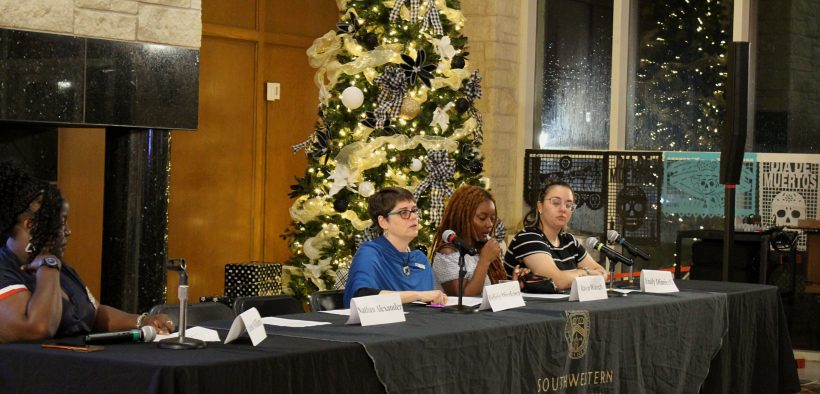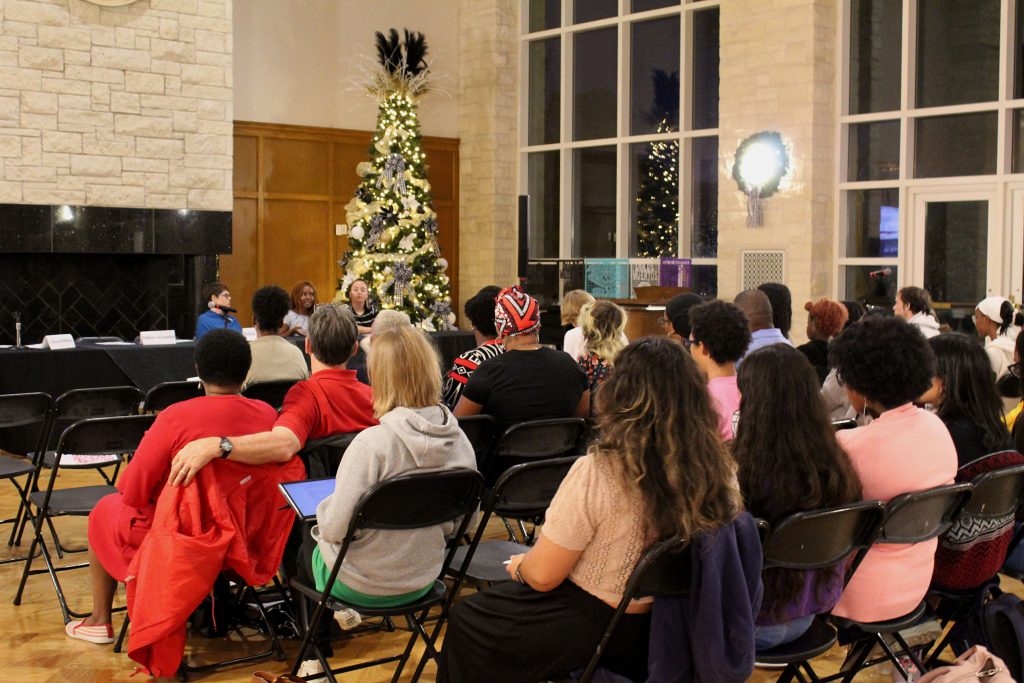JEDI Debriefs Presidential Election
Share

With the conclusion of the 2024 elections, Americans on both sides of the aisle, including students here at SU, have the burning question: “Now what?” How will Donald Trump’s victory impact us nationally, and how will Ted Cruz’s re-election into the US Senate affect our lives as Texans? When examining American politics on a larger scale such as this, one may feel overwhelmed or powerless to bring about change. On November 7, SU’s Justice, Equity, Diversity, and Inclusion (JEDI) Center aimed to provide takeaways to students alongside other politically active organizations across SU, Georgetown, and Williamson County by focusing our political scope on the local government level. The discussion allowed students to see that American citizens have more power than they realize.
The discussion panel hosted by JEDI (and in partnership with the Austin Alumnae Chapter of Delta Sigma Theta Sorority, Alpha Alpha Nu Omega Chapter of Alpha Kappa Alpha Sorority, Black Student Union (BSU), and SU Votes of Southwestern University), titled “Where Do We Go from Here?” brought SU students and members of the Georgetown community together with the aim of civic engagement beyond just voting for the big elections of 2024. Those representing Southwestern were co-president of the BSU, Raven Waugh ‘26, and president of SU Votes and the Coalition for Chronic Illness, Emily Dimiceli ‘25. Outside of campus but inside Williamson County was Dr. Felicia Miyakawa, president of the League of Women Voters of Williamson County, and hailing from Austin was Shavonne Henderson, Professor at The University of Texas at Austin School of Law. National Treasurer of National Black Law Students Nathan Alexander III was also listed to speak but was absent.
Each speaker agreed unanimously that a citizen’s voice is loud when speaking and acting locally. The political moves that directly affect us the most are the ones that happen in our hometowns and cities. Dr. Miyakawa explains that this is where change starts. “Most people only start to think about voting a few days or weeks in advance of the national election and are completely unaware of local elections…doing this work successfully demands building coalitions, and you can’t do that at the last minute.” But where to start? The speakers knew that the answer to this question lies in volunteering. Mindful that free time is scarce for the younger generation, particularly for college students, Dr. Miyakawa and student Raven Waugh highlighted the “short-term” volunteering methods. Helping manage social media accounts for organizations, taking a shift to assist people at voting or voting registration stations, contacting voters to get the word out, and other forms of getting the word out that generally take 1-2 hours out of the day are some of the most accessible ways for young people with busy schedules to participate in civic engagement. Waugh states, “If other people can see what you’re doing, they’ll be like, ‘Oh! I want to do it too!’”

However, knowing what exactly you’re doing this for is the basis of all political action. Ironically, in today’s age of mass information, finding an accurate presentation of the facts has never been so challenging. “There’s just so many things happening all the time, both with elections and outside of elections, that it can be really hard to get the information or to take the time to learn those things,” says Dimiceli. Many people still don’t know how to vote, how to register, or where to find the resources to be fully informed. With this in mind, the panelists recommended that one gets their information on the government directly from the source. Voter guides, websites ending with .gov, and education programs in schools and the community (such as those hosted by the League of Women Voters) aim to teach people how to vote for what aligns with their individual values without bias or incorrect information. As Dimiceli also states, “People are more likely to be engaged if they understand what they’re engaged with.”
But sometimes, even after applying all the education and action possible, it still can’t feel like enough for civically engaged people. Despite Gen Z having the highest number of voters of any generation that voted at their current age (18-27), many feel hopeless and distrustful of the US political system. During the open Q&A, one audience member explained how, after the election, her daughter began to feel “powerless.” Dimiceli responded to this by further stressing the importance of community. “Especially if you belong to a marginalized group, just having that support and having people that understand what you’re going through…is really helpful to boost your morale.”
When asked individually why Gen Z had the most significant number of voters in young voter turnout history, Dr. Miyakawa explained that it may be because of all the history that they have lived through. From the COVID-19 pandemic to the Black Lives Matter movement of 2020, Gen Z has witnessed and experienced firsthand the domino effects of generations of political decisions. “I think that Gen Z is responding to ‘I gotta make this world a place for myself, and here’s one way I can be engaged in that.’” Finally, the panel stressed that voting is one of the countless ways to improve the world.
